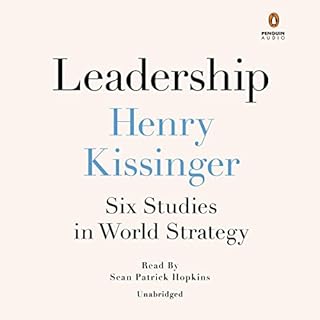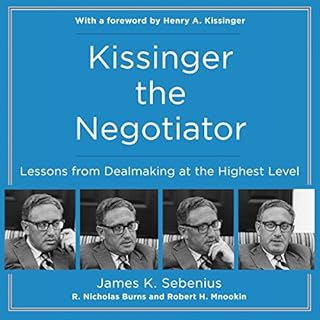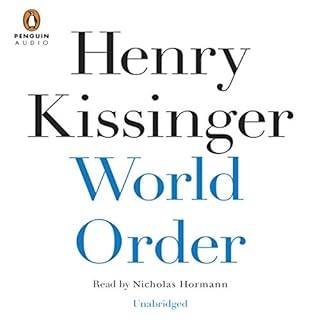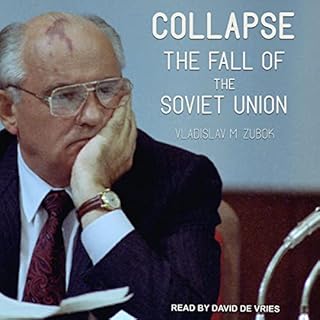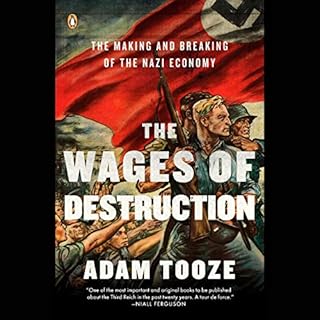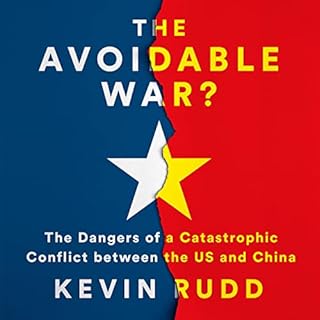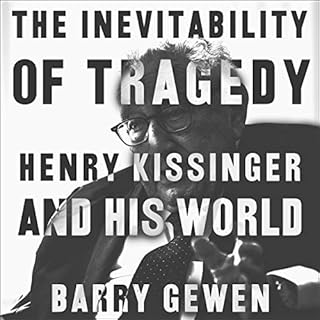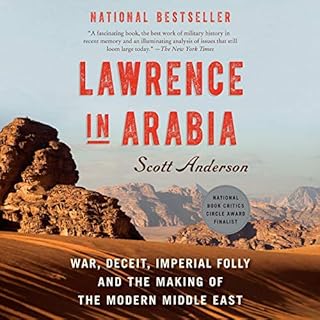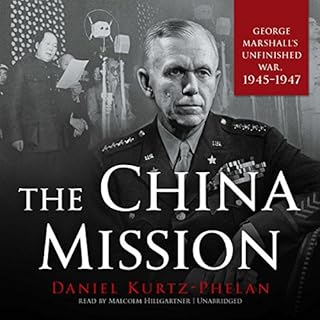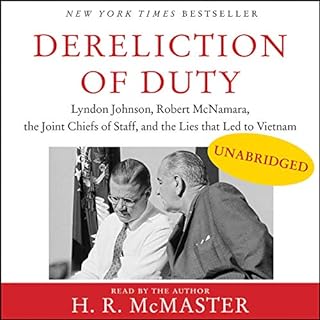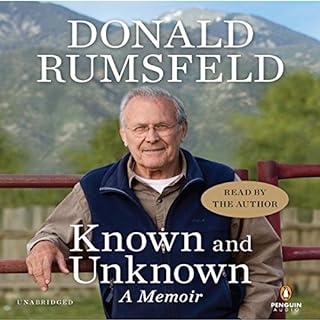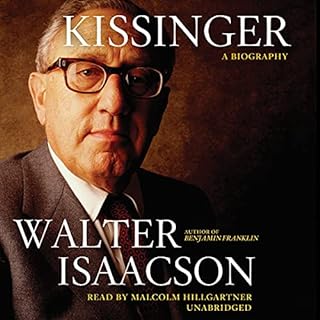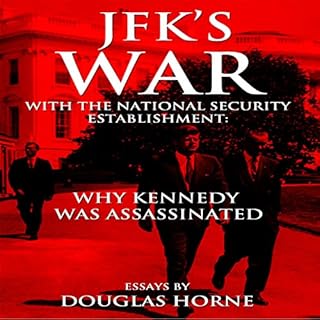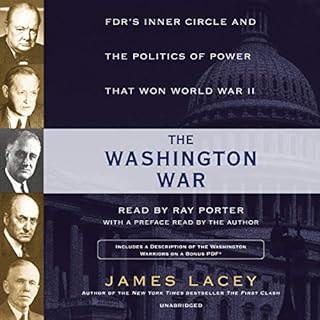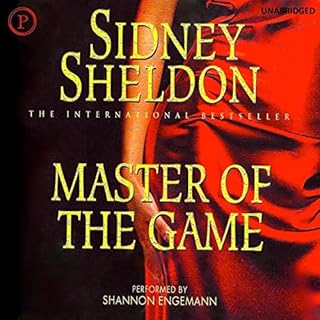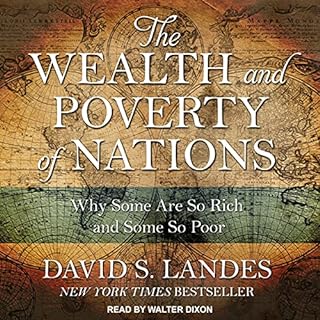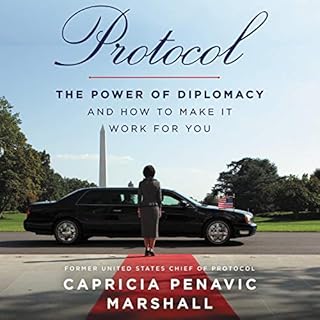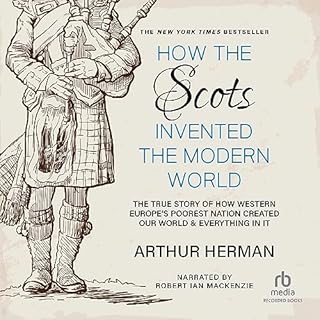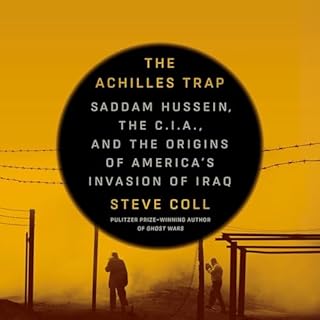
Master of the Game
Henry Kissinger and the Art of Middle East Diplomacy
No se pudo agregar al carrito
Add to Cart failed.
Error al Agregar a Lista de Deseos.
Error al eliminar de la lista de deseos.
Error al añadir a tu biblioteca
Error al seguir el podcast
Error al dejar de seguir el podcast
$0.99/mes por los primeros 3 meses
 Exclusivo para miembros Prime: ¿Nuevo en Audible?
Exclusivo para miembros Prime: ¿Nuevo en Audible?Obtén 2 audiolibros gratis con tu prueba.
Compra ahora por $27.00
No default payment method selected.
We are sorry. We are not allowed to sell this product with the selected payment method
-
Narrado por:
-
Simon Vance
-
De:
-
Martin Indyk
Acerca de esta escucha
A perceptive and provocative history of Henry Kissinger's diplomatic negotiations in the Middle East that illuminates the unique challenges and barriers Kissinger and his successors have faced in their attempts to broker peace between Israel and its Arab neighbors.
“A wealth of lessons for today, not only about the challenges in that region but also about the art of diplomacy.... The drama, dazzling maneuvers, and grand strategic vision.” (Walter Isaacson, author of The Code Breaker)
More than 20 years have elapsed since the United States last brokered a peace agreement between the Israelis and Palestinians. In that time, three presidents have tried and failed. Martin Indyk - a former United States ambassador to Israel and special envoy for the Israeli-Palestinian negotiations in 2013 - has experienced these political frustrations and disappointments firsthand.
Now, in an attempt to understand the arc of American diplomatic influence in the Middle East, he returns to the origins of American-led peace efforts and to the man who created the Middle East peace process - Henry Kissinger. Based on newly available documents from American and Israeli archives, extensive interviews with Kissinger, and Indyk's own interactions with some of the main players, the author takes listeners inside the negotiations. Here is a roster of larger-than-life characters - Anwar Sadat, Golda Meir, Moshe Dayan, Yitzhak Rabin, Hafez al-Assad, and Kissinger himself.
Indyk's account is both that of a historian poring over the records of these events, as well as an inside player seeking to glean lessons for Middle East peacemaking. He makes clear that understanding Kissinger's design for Middle East peacemaking is key to comprehending how to - and how not to - make peace.
©2021 Martin Indyk (P)2021 Random House AudioLos oyentes también disfrutaron...
-
Leadership
- Six Studies in World Strategy
- De: Henry Kissinger
- Narrado por: Sean Patrick Hopkins
- Duración: 19 h y 9 m
- Versión completa
-
General4.5 out of 5 stars 429
-
Narración:5 out of 5 stars 373
-
Historia5 out of 5 stars 373
Henry Kissinger analyses the lives of six extraordinary leaders—Konrad Adenauer, Charles de Gaulle, Richard Nixon, Anwar Sadat, Lee Kuan Yew, and Margaret Thatcher—through the distinctive strategies of statecraft that he believes they embodied. To each of these studies, Kissinger brings historical perception, public experience and, because he knew each of the subjects and participated in many of the events he describes, personal knowledge.
-
5 out of 5 stars
-
Architects of World Order
- De GrimLockz en 09-21-22
De: Henry Kissinger
-
Elon Musk
- De: Walter Isaacson
- Narrado por: Jeremy Bobb, Walter Isaacson
- Duración: 20 h y 39 m
- Versión completa
-
General5 out of 5 stars 7,963
-
Narración:5 out of 5 stars 6,961
-
Historia5 out of 5 stars 6,954
When Elon Musk was a kid in South Africa, he was regularly beaten by bullies. One day a group pushed him down some concrete steps and kicked him until his face was a swollen ball of flesh. He was in the hospital for a week. But the physical scars were minor compared to the emotional ones inflicted by his father, an engineer, rogue, and charismatic fantasist.
-
4 out of 5 stars
-
megalomania on display
- De JP en 09-12-23
De: Walter Isaacson
-
The Back Channel
- A Memoir of American Diplomacy and the Case for Its Renewal
- De: William J. Burns
- Narrado por: Mark Bramhall, William J. Burns
- Duración: 17 h y 5 m
- Versión completa
-
General4.5 out of 5 stars 430
-
Narración:5 out of 5 stars 381
-
Historia4.5 out of 5 stars 377
Over the course of more than three decades as an American diplomat, William J. Burns played a central role in the most consequential diplomatic episodes of his time - from the bloodless end of the Cold War to the collapse of post-Cold War relations with Putin’s Russia, from post-9/11 tumult in the Middle East to the secret nuclear talks with Iran. In The Back Channel, Burns recounts, with novelistic detail and incisive analysis, some of the seminal moments of his career.
-
5 out of 5 stars
-
A Definitive look at Diplomacy
- De Jean en 07-19-19
De: William J. Burns
-
Kissinger the Negotiator
- Lessons from Dealmaking at the Highest Level
- De: James K. Sebenius, R. Nicholas Burns, Robert H. Mnookin
- Narrado por: Fred Sanders
- Duración: 10 h y 57 m
- Versión completa
-
General4.5 out of 5 stars 65
-
Narración:4.5 out of 5 stars 48
-
Historia4.5 out of 5 stars 48
Political leaders, diplomats, and business executives around the world - including every president from John F. Kennedy to Donald J. Trump - have sought the counsel of Henry Kissinger, a brilliant diplomat and political scientist whose unprecedented achievements as a negotiator have been universally acknowledged. Now, Kissinger the Negotiator provides a groundbreaking analysis of Kissinger’s overall approach to making deals and his skill in resolving conflicts - expertise that holds powerful and enduring lessons.
-
5 out of 5 stars
-
Fascinating analysis of meaningful world events
- De Martin D. en 04-19-20
De: James K. Sebenius, y otros
-
World Order
- De: Henry Kissinger
- Narrado por: Nicholas Hormann
- Duración: 14 h y 9 m
- Versión completa
-
General4.5 out of 5 stars 1,376
-
Narración:4.5 out of 5 stars 1,169
-
Historia4.5 out of 5 stars 1,162
Henry Kissinger offers in World Order a deep meditation on the roots of international harmony and global disorder. Drawing on his experience as one of the foremost statesmen of the modern era Kissinger now reveals his analysis of the ultimate challenge for the 21st century: How to build a shared international order in a world of divergent historical perspectives, violent conflict, proliferating technology, and ideological extremism.
-
4 out of 5 stars
-
More retrospective than future oriented
- De Scott en 10-23-14
De: Henry Kissinger
-
Collapse
- The Fall of the Soviet Union
- De: Vladislav M. Zubok
- Narrado por: David de Vries
- Duración: 23 h y 50 m
- Versión completa
-
General4.5 out of 5 stars 430
-
Narración:5 out of 5 stars 371
-
Historia4.5 out of 5 stars 369
In 1945, the Soviet Union controlled half of Europe and was a founding member of the United Nations. By 1991, it had an army four million strong, 5,000 nuclear-tipped missiles, and was the second biggest producer of oil in the world. But soon afterward, the union sank into an economic crisis and was torn apart by nationalist separatism. Its collapse was one of the seismic shifts of the 20th century.
-
4 out of 5 stars
-
Hopefully Not Prescient
- De Joshua en 01-29-22
-
Leadership
- Six Studies in World Strategy
- De: Henry Kissinger
- Narrado por: Sean Patrick Hopkins
- Duración: 19 h y 9 m
- Versión completa
-
General4.5 out of 5 stars 429
-
Narración:5 out of 5 stars 373
-
Historia5 out of 5 stars 373
Henry Kissinger analyses the lives of six extraordinary leaders—Konrad Adenauer, Charles de Gaulle, Richard Nixon, Anwar Sadat, Lee Kuan Yew, and Margaret Thatcher—through the distinctive strategies of statecraft that he believes they embodied. To each of these studies, Kissinger brings historical perception, public experience and, because he knew each of the subjects and participated in many of the events he describes, personal knowledge.
-
5 out of 5 stars
-
Architects of World Order
- De GrimLockz en 09-21-22
De: Henry Kissinger
-
Elon Musk
- De: Walter Isaacson
- Narrado por: Jeremy Bobb, Walter Isaacson
- Duración: 20 h y 39 m
- Versión completa
-
General5 out of 5 stars 7,963
-
Narración:5 out of 5 stars 6,961
-
Historia5 out of 5 stars 6,954
When Elon Musk was a kid in South Africa, he was regularly beaten by bullies. One day a group pushed him down some concrete steps and kicked him until his face was a swollen ball of flesh. He was in the hospital for a week. But the physical scars were minor compared to the emotional ones inflicted by his father, an engineer, rogue, and charismatic fantasist.
-
4 out of 5 stars
-
megalomania on display
- De JP en 09-12-23
De: Walter Isaacson
-
The Back Channel
- A Memoir of American Diplomacy and the Case for Its Renewal
- De: William J. Burns
- Narrado por: Mark Bramhall, William J. Burns
- Duración: 17 h y 5 m
- Versión completa
-
General4.5 out of 5 stars 430
-
Narración:5 out of 5 stars 381
-
Historia4.5 out of 5 stars 377
Over the course of more than three decades as an American diplomat, William J. Burns played a central role in the most consequential diplomatic episodes of his time - from the bloodless end of the Cold War to the collapse of post-Cold War relations with Putin’s Russia, from post-9/11 tumult in the Middle East to the secret nuclear talks with Iran. In The Back Channel, Burns recounts, with novelistic detail and incisive analysis, some of the seminal moments of his career.
-
5 out of 5 stars
-
A Definitive look at Diplomacy
- De Jean en 07-19-19
De: William J. Burns
-
Kissinger the Negotiator
- Lessons from Dealmaking at the Highest Level
- De: James K. Sebenius, R. Nicholas Burns, Robert H. Mnookin
- Narrado por: Fred Sanders
- Duración: 10 h y 57 m
- Versión completa
-
General4.5 out of 5 stars 65
-
Narración:4.5 out of 5 stars 48
-
Historia4.5 out of 5 stars 48
Political leaders, diplomats, and business executives around the world - including every president from John F. Kennedy to Donald J. Trump - have sought the counsel of Henry Kissinger, a brilliant diplomat and political scientist whose unprecedented achievements as a negotiator have been universally acknowledged. Now, Kissinger the Negotiator provides a groundbreaking analysis of Kissinger’s overall approach to making deals and his skill in resolving conflicts - expertise that holds powerful and enduring lessons.
-
5 out of 5 stars
-
Fascinating analysis of meaningful world events
- De Martin D. en 04-19-20
De: James K. Sebenius, y otros
-
World Order
- De: Henry Kissinger
- Narrado por: Nicholas Hormann
- Duración: 14 h y 9 m
- Versión completa
-
General4.5 out of 5 stars 1,376
-
Narración:4.5 out of 5 stars 1,169
-
Historia4.5 out of 5 stars 1,162
Henry Kissinger offers in World Order a deep meditation on the roots of international harmony and global disorder. Drawing on his experience as one of the foremost statesmen of the modern era Kissinger now reveals his analysis of the ultimate challenge for the 21st century: How to build a shared international order in a world of divergent historical perspectives, violent conflict, proliferating technology, and ideological extremism.
-
4 out of 5 stars
-
More retrospective than future oriented
- De Scott en 10-23-14
De: Henry Kissinger
-
Collapse
- The Fall of the Soviet Union
- De: Vladislav M. Zubok
- Narrado por: David de Vries
- Duración: 23 h y 50 m
- Versión completa
-
General4.5 out of 5 stars 430
-
Narración:5 out of 5 stars 371
-
Historia4.5 out of 5 stars 369
In 1945, the Soviet Union controlled half of Europe and was a founding member of the United Nations. By 1991, it had an army four million strong, 5,000 nuclear-tipped missiles, and was the second biggest producer of oil in the world. But soon afterward, the union sank into an economic crisis and was torn apart by nationalist separatism. Its collapse was one of the seismic shifts of the 20th century.
-
4 out of 5 stars
-
Hopefully Not Prescient
- De Joshua en 01-29-22
-
On China
- De: Henry Kissinger
- Narrado por: Nicholas Hormann
- Duración: 20 h y 10 m
- Versión completa
-
General4.5 out of 5 stars 1,394
-
Narración:4.5 out of 5 stars 1,154
-
Historia4.5 out of 5 stars 1,147
In this sweeping and insightful history, Henry Kissinger turns for the first time at book length to a country he has known intimately for decades and whose modern relations with the West he helped shape. On China illuminates the inner workings of Chinese diplomacy during such pivotal events as the initial encounters between China and tight line modern European powers, the formation and breakdown of the Sino-Soviet alliance, the Korean War, and Richard Nixon’s historic trip to Beijing.
-
3 out of 5 stars
-
Another History of China
- De Elton en 09-23-11
De: Henry Kissinger
-
Bibi
- My Story
- De: Benjamin Netanyahu
- Narrado por: David Marantz, Benjamin Netanyahu
- Duración: 25 h y 49 m
- Versión completa
-
General5 out of 5 stars 940
-
Narración:5 out of 5 stars 861
-
Historia5 out of 5 stars 860
In Benjamin “Bibi” Netanyahu’s New York Times bestselling autobiography, the prime minister of Israel tells the story of his family, his path to leadership, and his unceasing commitment to defending his country and securing its future. Through a host of vivid anecdotes, he narrates his own evolution from soldier to statesman, while providing a unique perspective on leadership, the fraught geopolitics of the Middle East, and his successful efforts to liberate Israel’s economy, which helped turn it into a global powerhouse of technological innovation.
-
2 out of 5 stars
-
This is a spin piece, not an autobiography
- De Powernoodle en 12-03-22
-
The Economic Weapon
- The Rise of Sanctions as a Tool of Modern War
- De: Nicholas Mulder
- Narrado por: Liam Gerrard
- Duración: 12 h y 25 m
- Versión completa
-
General4.5 out of 5 stars 109
-
Narración:4.5 out of 5 stars 82
-
Historia4.5 out of 5 stars 83
Economic sanctions dominate the landscape of world politics today. First developed in the early twentieth century as a way of exploiting the flows of globalization to defend liberal internationalism, their appeal is that they function as an alternative to war. This view, however, ignores the dark paradox at their core: designed to prevent war, economic sanctions are modeled on devastating techniques of warfare.
-
5 out of 5 stars
-
History of sanctions during the early 20th century
- De Mehdi Mollahasani en 03-05-22
De: Nicholas Mulder
-
Chip War
- The Quest to Dominate the World's Most Critical Technology
- De: Chris Miller
- Narrado por: Stephen Graybill
- Duración: 12 h y 38 m
- Versión completa
-
General5 out of 5 stars 2,322
-
Narración:4.5 out of 5 stars 1,970
-
Historia5 out of 5 stars 1,968
You may be surprised to learn that microchips are the new oil—the scarce resource on which the modern world depends. Today, military, economic, and geopolitical power are built on a foundation of computer chips. Virtually everything—from missiles to microwaves—runs on chips, including cars, smartphones, the stock market, even the electric grid. Until recently, America designed and built the fastest chips and maintained its lead as the #1 superpower, but America’s edge is in danger of slipping, undermined by players in Taiwan, Korea, and Europe taking over manufacturing.
-
5 out of 5 stars
-
Great history, but could poor narration
- De Lily Wong en 10-26-22
De: Chris Miller
-
Thirteen Days in September
- Carter, Begin, and Sadat at Camp David
- De: Lawrence Wright
- Narrado por: Mark Bramhall, Lawrence Wright
- Duración: 11 h y 55 m
- Versión completa
-
General4.5 out of 5 stars 325
-
Narración:4.5 out of 5 stars 294
-
Historia4.5 out of 5 stars 294
A gripping day-by-day account of the 1978 Camp David conference, when President Jimmy Carter persuaded Israeli prime minister Menachem Begin and Egyptian president Anwar Sadat to sign the first peace treaty in the modern Middle East, one which endures to this day.
-
4 out of 5 stars
-
Lessons in Negotiation
- De David en 06-18-15
De: Lawrence Wright
-
Target Tehran
- How Israel Is Using Sabotage, Cyberwarfare, Assassination – and Secret Diplomacy – to Stop a Nuclear Iran and Create a New Middle East
- De: Yonah Jeremy Bob, Ilan Evyatar
- Narrado por: Jonathan Davis
- Duración: 11 h y 11 m
- Versión completa
-
General4.5 out of 5 stars 49
-
Narración:5 out of 5 stars 41
-
Historia5 out of 5 stars 41
Yonah Bob and Ilan Evyatar describe how Israel has used cyberwarfare, targeted assassinations, and sabotage of Iranian facilities to great effect, sometimes in cooperation with the United States. Even as it takes lethal action, Israel has managed to alter the politics of the Middle East, culminating in the Abraham Accords of 2020. Arab states such as Bahrain and the United Arab Emirates normalized relations with Israel, and the holy grail of normalization with Saudi Arabia may yet be achieved.
-
5 out of 5 stars
-
Couldn’t walk away !
- De ADAM en 01-10-24
De: Yonah Jeremy Bob, y otros
-
The Man Who Ran Washington
- The Life and Times of James A. Baker III
- De: Peter Baker, Susan Glasser
- Narrado por: Michael Quinlan
- Duración: 26 h y 35 m
- Versión completa
-
General5 out of 5 stars 883
-
Narración:5 out of 5 stars 751
-
Historia5 out of 5 stars 743
For a quarter-century, from the end of Watergate to the aftermath of the Cold War, no Republican won the presidency without his help or ran the White House without his advice. James Addison Baker III was the indispensable man for four presidents because he understood better than anyone how to make Washington work at a time when America was shaping events around the world. The Man Who Ran Washington is a pause-resisting portrait of a power broker who influenced America's destiny for generations.
-
5 out of 5 stars
-
We Need Baker Now More Than Ever
- De @Gazi2a en 01-08-21
De: Peter Baker, y otros
-
The Wages of Destruction
- The Making and Breaking of the Nazi Economy
- De: Adam Tooze
- Narrado por: Adam Tooze, Simon Vance
- Duración: 30 h y 19 m
- Versión completa
-
General5 out of 5 stars 335
-
Narración:5 out of 5 stars 289
-
Historia5 out of 5 stars 287
An extraordinary mythology has grown up around the Third Reich that hovers over political and moral debate even today. Adam Tooze's controversial book challenges the conventional economic interpretations of that period.
-
5 out of 5 stars
-
Ties the story together in an amazing way
- De Philo en 08-23-21
De: Adam Tooze
-
Duty
- Memoirs of a Secretary at War
- De: Robert M. Gates
- Narrado por: George Newbern, Robert M. Gates
- Duración: 25 h y 38 m
- Versión completa
-
General4.5 out of 5 stars 2,467
-
Narración:4.5 out of 5 stars 2,174
-
Historia4.5 out of 5 stars 2,166
From the former secretary of defense, a strikingly candid, vivid account of serving Presidents George W. Bush and Barack Obama during the wars in Iraq and Afghanistan. When Robert M. Gates received a call from the White House, he thought he'd long left Washington politics behind: After working for six presidents in both the CIA and the National Security Council, he was happily serving as president of Texas A&M University. But when he was asked to help a nation mired in two wars and to aid the troops doing the fighting, he answered what he felt was the call of duty.
-
4 out of 5 stars
-
The Fighting Season
- De Cynthia en 01-28-14
De: Robert M. Gates
-
The Avoidable War
- The Dangers of a Catastrophic Conflict between the US and Xi Jinping's China
- De: Kevin Rudd
- Narrado por: Kevin Rudd, Rafe Beckley
- Duración: 16 h y 9 m
- Versión completa
-
General4.5 out of 5 stars 268
-
Narración:5 out of 5 stars 232
-
Historia4.5 out of 5 stars 228
The relationship between the US and China, the world’s two superpowers, is peculiarly volatile. Their militaries play a dangerous game of chicken, corporations steal intellectual property, intelligence satellites peer, and AI technicians plot. The capacity for either country to cross a fatal line grows daily. Kevin Rudd, a former Australian prime minister who has studied, lived in, and worked with China for more than forty years, is one of the very few people who can offer real insight into the mindsets of the leadership whose judgment will determine if a war will be fought.
-
2 out of 5 stars
-
Xi and the CCP Approve this Message
- De Andrizomai en 12-04-22
De: Kevin Rudd
-
The Inevitability of Tragedy
- Henry Kissinger and His World
- De: Barry Gewen
- Narrado por: Paul Woodson
- Duración: 18 h y 46 m
- Versión completa
-
General4.5 out of 5 stars 75
-
Narración:4.5 out of 5 stars 56
-
Historia4.5 out of 5 stars 56
Few public officials have provoked such intense controversy as Henry Kissinger. During his time in the Nixon and Ford administrations, he came to be admired and hated in equal measure. Notoriously, he believed that foreign affairs ought to be based primarily on the power relationships of a situation, not simply on ethics. He went so far as to argue that under certain circumstances America had to protect its national interests even if that meant repressing other countries' attempts at democracy.
-
3 out of 5 stars
-
Interesting but rambles
- De K en 02-17-21
De: Barry Gewen
-
Lawrence in Arabia
- War, Deceit, Imperial Folly and the Making of the Modern Middle East
- De: Scott Anderson
- Narrado por: Malcolm Hillgartner
- Duración: 23 h y 45 m
- Versión completa
-
General4.5 out of 5 stars 287
-
Narración:4.5 out of 5 stars 254
-
Historia4.5 out of 5 stars 254
A thrilling and revelatory narrative of one of the most epic and consequential periods in 20th century history - the Arab Revolt and the secret “great game” to control the Middle East. Lawrence in Arabia definitively overturns received wisdom on how the modern Middle East was formed. Sweeping in its action, keen in its portraiture, acid in its condemnation of the destruction wrought by European colonial plots, this is a book that brilliantly captures the way in which the folly of the past creates the anguish of the present.
-
5 out of 5 stars
-
A Comprehensive, Compelling Biography
- De Lester Gesteland en 10-05-20
De: Scott Anderson
Reseñas de la Crítica
“A gripping history of how the United States used peacemaking to supplant the Soviet Union as the dominant foreign power in the region.” (Thomas L. Friedman, The New York Times)
“When Indyk analyzes the obstacles that Kissinger overcame, he knows of what he speaks. Decades after Kissinger left the State Department, the author dealt with similar issues as U.S. ambassador to Israel and special presidential envoy. His book draws on his experiences as well as extensive research in American and Israeli archives. Most of all, Indyk captures the unique intensity of diplomacy in this region, where every gesture is treated with suspicion, and every concession is a matter of life or death.... Indyk’s book is a brilliant account of how the mastery of personal diplomacy can depart from the diplomat’s true mission of peace.” (Jeremi Suri, The New York Times Book Review)
“Martin Indyk’s lucidly conceived and compellingly written Master of the Game: Henry Kissinger and the Art of Middle East Diplomacy is much more than a tale of long-ago diplomatic tussles in a faraway place. The issues surrounding Mr. Kissinger’s approach to foreign policy remain current, and Mr. Indyk brings to the task of examining them his years of diplomatic experience in the Clinton and Obama administrations. His book deserves careful attention.” (Walter Russell Mead, The Wall Street Journal)
Relacionado con este tema
-
Doomed to Succeed
- The U.S.-Israel Relationship from Truman to Obama
- De: Dennis Ross
- Narrado por: Michael Kramer
- Duración: 18 h y 50 m
- Versión completa
-
General4.5 out of 5 stars 127
-
Narración:4.5 out of 5 stars 117
-
Historia4.5 out of 5 stars 118
In Doomed to Succeed, Ross takes us through every administration from Truman to Obama, throwing into dramatic relief each president's attitudes toward Israel and the region, the often tumultuous debates between key advisers, and the events that drove the policies and at times led to a shift in approach.
-
5 out of 5 stars
-
Even Handed Report
- De Jean en 11-21-15
De: Dennis Ross
-
Gambling with Armageddon
- Nuclear Roulette from Hiroshima to the Cuban Missile Crisis
- De: Martin J. Sherwin
- Narrado por: Mark Bramhall
- Duración: 18 h y 50 m
- Versión completa
-
General4.5 out of 5 stars 70
-
Narración:4.5 out of 5 stars 62
-
Historia4.5 out of 5 stars 60
In this groundbreaking look at the Cuban Missile Crisis, Martin Sherwin not only gives us a riveting sometimes hour-by-hour explanation of the crisis itself, but also explores the origins, scope, and consequences of the evolving place of nuclear weapons in the post-World War II world. Mining new sources and materials, and going far beyond the scope of earlier works on this critical face-off between the United States and the Soviet Union — triggered when Khrushchev began installing missiles in Cuba at Castro's behest....
-
5 out of 5 stars
-
Important History
- De J. B. Evans en 06-12-21
-
Losing an Enemy
- Obama, Iran, and the Triumph of Diplomacy
- De: Trita Parsi
- Narrado por: Paul Boehmer
- Duración: 17 h y 18 m
- Versión completa
-
General5 out of 5 stars 49
-
Narración:4.5 out of 5 stars 44
-
Historia5 out of 5 stars 45
This timely book focuses on President Obama's deeply considered strategy toward Iran's nuclear program and reveals how the historic agreement of 2015 broke the persistent stalemate in negotiations that had blocked earlier efforts. Drawing from more than 75 in-depth interviews with key decision-makers, including Iran's Foreign Minister Javad Zarif and US Secretary of State John Kerry, this is the first authoritative account of President Obama's signature foreign policy achievement.
-
5 out of 5 stars
-
required reading
- De Seth K en 07-18-19
De: Trita Parsi
-
Ike's Gamble
- America's Rise to Dominance in the Middle East
- De: Michael Doran
- Narrado por: Casey Jones
- Duración: 9 h y 1 m
- Versión completa
-
General4.5 out of 5 stars 74
-
Narración:4.5 out of 5 stars 68
-
Historia4.5 out of 5 stars 69
In 1956 President Nasser of Egypt moved to take possession of the Suez Canal, thereby bringing the Middle East to the brink of war. The British and the French, who operated the canal, joined with Israel in a plan to retake it by force. Despite the special relationship between England and America, Dwight Eisenhower intervened to stop the invasion.
-
4 out of 5 stars
-
Tightly Argued
- De Jean en 01-10-17
De: Michael Doran
-
Road to Disaster
- A New History of America’s Descent into Vietnam
- De: Brian VanDeMark
- Narrado por: Ron Butler
- Duración: 23 h y 12 m
- Versión completa
-
General5 out of 5 stars 82
-
Narración:5 out of 5 stars 76
-
Historia5 out of 5 stars 76
Many books have been written on the tragic decisions regarding Vietnam made by the stars of the Kennedy and Johnson administrations. Yet despite many words of analysis and reflection, no historian has been able to explain why such decent and previously successful men stumbled so badly. That changes with Road to Disaster. Historian Brian VanDeMark draws upon decades of archival research, his own interviews with many of those involved, and a wealth of previously unheard recordings by Robert McNamara and Clark Clifford, who served as Defense Secretaries for Kennedy and Johnson.
-
5 out of 5 stars
-
Vietnam Veteran
- De Jim Rollins en 04-02-19
De: Brian VanDeMark
-
Not One Inch
- America, Russia, and the Making of Post-Cold War Stalemate
- De: M.E. Sarotte
- Narrado por: Teri Schnaubelt
- Duración: 15 h y 54 m
- Versión completa
-
General4.5 out of 5 stars 215
-
Narración:4.5 out of 5 stars 185
-
Historia4.5 out of 5 stars 185
Based on over a hundred interviews and on secret records of White House-Kremlin contacts, Not One Inch shows how the United States successfully overcame Russian resistance in the 1990s to expand NATO to more than 900 million people. But it also reveals how Washington's hardball tactics transformed the era between the Cold War and the present day, undermining what could have become a lasting partnership.
-
5 out of 5 stars
-
America's NATO problem
- De Jeffrey D en 03-24-22
De: M.E. Sarotte
-
Doomed to Succeed
- The U.S.-Israel Relationship from Truman to Obama
- De: Dennis Ross
- Narrado por: Michael Kramer
- Duración: 18 h y 50 m
- Versión completa
-
General4.5 out of 5 stars 127
-
Narración:4.5 out of 5 stars 117
-
Historia4.5 out of 5 stars 118
In Doomed to Succeed, Ross takes us through every administration from Truman to Obama, throwing into dramatic relief each president's attitudes toward Israel and the region, the often tumultuous debates between key advisers, and the events that drove the policies and at times led to a shift in approach.
-
5 out of 5 stars
-
Even Handed Report
- De Jean en 11-21-15
De: Dennis Ross
-
Gambling with Armageddon
- Nuclear Roulette from Hiroshima to the Cuban Missile Crisis
- De: Martin J. Sherwin
- Narrado por: Mark Bramhall
- Duración: 18 h y 50 m
- Versión completa
-
General4.5 out of 5 stars 70
-
Narración:4.5 out of 5 stars 62
-
Historia4.5 out of 5 stars 60
In this groundbreaking look at the Cuban Missile Crisis, Martin Sherwin not only gives us a riveting sometimes hour-by-hour explanation of the crisis itself, but also explores the origins, scope, and consequences of the evolving place of nuclear weapons in the post-World War II world. Mining new sources and materials, and going far beyond the scope of earlier works on this critical face-off between the United States and the Soviet Union — triggered when Khrushchev began installing missiles in Cuba at Castro's behest....
-
5 out of 5 stars
-
Important History
- De J. B. Evans en 06-12-21
-
Losing an Enemy
- Obama, Iran, and the Triumph of Diplomacy
- De: Trita Parsi
- Narrado por: Paul Boehmer
- Duración: 17 h y 18 m
- Versión completa
-
General5 out of 5 stars 49
-
Narración:4.5 out of 5 stars 44
-
Historia5 out of 5 stars 45
This timely book focuses on President Obama's deeply considered strategy toward Iran's nuclear program and reveals how the historic agreement of 2015 broke the persistent stalemate in negotiations that had blocked earlier efforts. Drawing from more than 75 in-depth interviews with key decision-makers, including Iran's Foreign Minister Javad Zarif and US Secretary of State John Kerry, this is the first authoritative account of President Obama's signature foreign policy achievement.
-
5 out of 5 stars
-
required reading
- De Seth K en 07-18-19
De: Trita Parsi
-
Ike's Gamble
- America's Rise to Dominance in the Middle East
- De: Michael Doran
- Narrado por: Casey Jones
- Duración: 9 h y 1 m
- Versión completa
-
General4.5 out of 5 stars 74
-
Narración:4.5 out of 5 stars 68
-
Historia4.5 out of 5 stars 69
In 1956 President Nasser of Egypt moved to take possession of the Suez Canal, thereby bringing the Middle East to the brink of war. The British and the French, who operated the canal, joined with Israel in a plan to retake it by force. Despite the special relationship between England and America, Dwight Eisenhower intervened to stop the invasion.
-
4 out of 5 stars
-
Tightly Argued
- De Jean en 01-10-17
De: Michael Doran
-
Road to Disaster
- A New History of America’s Descent into Vietnam
- De: Brian VanDeMark
- Narrado por: Ron Butler
- Duración: 23 h y 12 m
- Versión completa
-
General5 out of 5 stars 82
-
Narración:5 out of 5 stars 76
-
Historia5 out of 5 stars 76
Many books have been written on the tragic decisions regarding Vietnam made by the stars of the Kennedy and Johnson administrations. Yet despite many words of analysis and reflection, no historian has been able to explain why such decent and previously successful men stumbled so badly. That changes with Road to Disaster. Historian Brian VanDeMark draws upon decades of archival research, his own interviews with many of those involved, and a wealth of previously unheard recordings by Robert McNamara and Clark Clifford, who served as Defense Secretaries for Kennedy and Johnson.
-
5 out of 5 stars
-
Vietnam Veteran
- De Jim Rollins en 04-02-19
De: Brian VanDeMark
-
Not One Inch
- America, Russia, and the Making of Post-Cold War Stalemate
- De: M.E. Sarotte
- Narrado por: Teri Schnaubelt
- Duración: 15 h y 54 m
- Versión completa
-
General4.5 out of 5 stars 215
-
Narración:4.5 out of 5 stars 185
-
Historia4.5 out of 5 stars 185
Based on over a hundred interviews and on secret records of White House-Kremlin contacts, Not One Inch shows how the United States successfully overcame Russian resistance in the 1990s to expand NATO to more than 900 million people. But it also reveals how Washington's hardball tactics transformed the era between the Cold War and the present day, undermining what could have become a lasting partnership.
-
5 out of 5 stars
-
America's NATO problem
- De Jeffrey D en 03-24-22
De: M.E. Sarotte
-
How Wars End
- Why We Always Fight the Last Battle
- De: Gideon Rose
- Narrado por: Gideon Rose
- Duración: 12 h y 28 m
- Versión completa
-
General4 out of 5 stars 117
-
Narración:4 out of 5 stars 72
-
Historia4 out of 5 stars 70
In 1991, the United States Army trounced the Iraqi army in battle only to stumble blindly into postwar turmoil. Then in 2003 the United States did it again. How could this happen? How could the strongest power in modern history fight two wars against the same opponent in just over a decade, win lightning victories both times, and yet still be woefully unprepared for the aftermath? Because Americans always forget the political aspects of war.
-
4 out of 5 stars
-
Excellent book
- De Luis en 11-04-10
De: Gideon Rose
-
Duty
- Memoirs of a Secretary at War
- De: Robert M. Gates
- Narrado por: George Newbern, Robert M. Gates
- Duración: 25 h y 38 m
- Versión completa
-
General4.5 out of 5 stars 2,467
-
Narración:4.5 out of 5 stars 2,174
-
Historia4.5 out of 5 stars 2,166
From the former secretary of defense, a strikingly candid, vivid account of serving Presidents George W. Bush and Barack Obama during the wars in Iraq and Afghanistan. When Robert M. Gates received a call from the White House, he thought he'd long left Washington politics behind: After working for six presidents in both the CIA and the National Security Council, he was happily serving as president of Texas A&M University. But when he was asked to help a nation mired in two wars and to aid the troops doing the fighting, he answered what he felt was the call of duty.
-
4 out of 5 stars
-
The Fighting Season
- De Cynthia en 01-28-14
De: Robert M. Gates
-
Camelot's Court
- Inside the Kennedy White House
- De: Robert Dallek
- Narrado por: James Lurie
- Duración: 16 h y 50 m
- Versión completa
-
General4 out of 5 stars 80
-
Narración:4.5 out of 5 stars 69
-
Historia4 out of 5 stars 69
Fifty years after John F. Kennedy's assassination, presidential historian Robert Dallek, whom The New York Times calls "Kennedy's leading biographer", delivers a riveting new portrait of this president and his inner circle of advisors, their rivalries, personality clashes, and political battles. In Camelot's Court, Dallek analyzes the brain trust whose contributions to the successes and failures of Kennedy's administration - including the Bay of Pigs, civil rights, the Cuban Missile Crisis, and Vietnam - were indelible.
-
3 out of 5 stars
-
Well Researched but Critically Flawed
- De brent lloyd en 02-08-22
De: Robert Dallek
-
The China Mission
- De: Daniel Kurtz-Phelan
- Narrado por: Malcolm Hillgartner
- Duración: 13 h y 59 m
- Versión completa
-
General4.5 out of 5 stars 418
-
Narración:4.5 out of 5 stars 371
-
Historia4.5 out of 5 stars 368
As World War II came to an end, General George Marshall was renowned as the architect of Allied victory. Set to retire, he instead accepted what he thought was a final mission - this time not to win a war, but to stop one. Across the Pacific, conflict between Chinese Nationalists and Communists threatened to suck in the United States and escalate into revolution. His assignment was to broker a peace, build a Chinese democracy, and prevent a Communist takeover, all while staving off World War III.
-
5 out of 5 stars
-
A Previously Untold Story of a Failed Mission
- De Jonathan Love en 05-29-18
-
Berlin 1961
- Kennedy, Khrushchev, and the Most Dangerous Place on Earth
- De: Frederick Kempe
- Narrado por: Paul Hecht
- Duración: 20 h y 5 m
- Versión completa
-
General4.5 out of 5 stars 350
-
Narración:4.5 out of 5 stars 306
-
Historia4.5 out of 5 stars 304
A former Wall Street Journal editor and the current president and CEO of the Atlantic Council, Frederick Kempe draws on recently released documents and personal interviews to re-create the powder keg that was 1961 Berlin. In Cold War Berlin, the United States and the Soviet Union stand nose to nose, with the possibility of nuclear war just one misstep away.
-
5 out of 5 stars
-
I am scared in retrospect
- De theenglishmajor en 06-26-11
De: Frederick Kempe
-
Hanoi’s War
- An International History of the War for Peace in Vietnam
- De: Lien-Hang T. Nguyen
- Narrado por: Hillary Huber
- Duración: 15 h y 12 m
- Versión completa
-
General4 out of 5 stars 49
-
Narración:4 out of 5 stars 44
-
Historia4.5 out of 5 stars 42
While most historians of the Vietnam War focus on the origins of US involvement and the Americanization of the conflict, Lien-Hang T. Nguyen examines the international context in which North Vietnamese leaders pursued the war and American intervention ended. This riveting narrative takes the listener from the marshy Mekong Delta swamps to the bomb-saturated Red River Delta, from the corridors of power in Hanoi and Saigon to the Nixon White House, and from the peace negotiations in Paris to high-level meetings in Beijing and Moscow.
-
5 out of 5 stars
-
Understanding politics in SE Asia.
- De Mark U. en 04-26-15
-
Embers of War
- The Fall of an Empire and the Making of America's Vietnam
- De: Fredrik Logevall
- Narrado por: Fred Sanders
- Duración: 32 h y 15 m
- Versión completa
-
General4.5 out of 5 stars 270
-
Narración:5 out of 5 stars 247
-
Historia5 out of 5 stars 242
In this landmark work that will forever change your understanding of how and why America went to war in Vietnam, author Fredrik Logevall taps newly accessible diplomatic archives in several nations and traces the path that led two Western nations to tragically lose their way in the jungles of Southeast Asia. He brings to life the bloodiest battles of France’s final years in Indochina - and describes how, from an early point, a succession of American leaders made disastrous policy choices that put America on its own collision course with history.
-
5 out of 5 stars
-
Understanding Why We failed the People of Vietnam
- De VA en 03-22-21
De: Fredrik Logevall
-
Dereliction of Duty
- Johnson, McNamara, the Joint Chiefs of Staff, and the Lies That Led to Vietnam
- De: H. R. McMaster
- Narrado por: H. R. McMaster
- Duración: 15 h y 58 m
- Versión completa
-
General4.5 out of 5 stars 409
-
Narración:4.5 out of 5 stars 357
-
Historia4.5 out of 5 stars 357
Dereliction of Duty is a stunning analysis of how and why the United States became involved in an all-out and disastrous war in Southeast Asia. Fully and convincingly researched, based on transcripts and personal accounts of crucial meetings, confrontations, and decisions, it is the only book that fully re-creates what happened and why. McMaster pinpoints the policies and decisions that got the United States into the morass and reveals who made these decisions and the motives behind them, disproving the published theories of other historians and excuses of the participants.
-
3 out of 5 stars
-
Rough narration
- De AC Griffin en 12-04-19
De: H. R. McMaster
-
Known and Unknown
- A Memoir
- De: Donald Rumsfeld
- Narrado por: Donald Rumsfeld
- Duración: 30 h y 10 m
- Versión completa
-
General4.5 out of 5 stars 605
-
Narración:4.5 out of 5 stars 404
-
Historia4.5 out of 5 stars 405
A powerful memoir from the late former US Secretary of Defense Donald Rumsfeld. With the same directness that defined his career in public service, Rumsfeld's memoir is filled with previously undisclosed details and insights about the Bush administration, 9/11, and the wars in Afghanistan and Iraq. It also features Rumsfeld's unique and often surprising observations on eight decades of history. Both a fascinating narrative and an unprecedented glimpse into history, Known and Unknown captures the legacy of one of the most influential men in public service.
-
5 out of 5 stars
-
Inside view of five decades in politics
- De Brooks en 02-19-11
De: Donald Rumsfeld
-
Kissinger
- A Biography
- De: Walter Isaacson
- Narrado por: Malcolm Hillgartner
- Duración: 34 h y 30 m
- Versión completa
-
General4.5 out of 5 stars 951
-
Narración:4.5 out of 5 stars 815
-
Historia4.5 out of 5 stars 816
By the time Henry Kissinger was made secretary of state in 1973, he had become, according to a Gallup poll, the most admired person in America and one of the most unlikely celebrities ever to capture the world’s imagination. Yet Kissinger was also reviled by large segments of the American public, ranging from liberal intellectuals to conservative activists. Kissinger explores the relationship between this complex man's personality and the foreign policy he pursued.
-
3 out of 5 stars
-
A dissapointment
- De Mike From Mesa en 12-16-13
De: Walter Isaacson
-
JFK's War with the National Security Establishment: Why Kennedy Was Assassinated
- De: Douglas Horne
- Narrado por: Larry Wayne
- Duración: 7 h y 45 m
- Versión completa
-
General5 out of 5 stars 84
-
Narración:5 out of 5 stars 74
-
Historia5 out of 5 stars 71
Ever since researchers and commentators began questioning the conclusions of the Warren Report on the assassination of President John F. Kennedy, the response has been: Why would the US national-security establishment - that is, the military and the CIA - kill Kennedy? As Douglas P. Horne details in this audiobook, JFK's War with the National Security Establishment: Why Kennedy Was Assassinated, the answer is because Kennedy's ideas about foreign policy collided with those of the US national-security establishment during the height of the Cold War.
-
5 out of 5 stars
-
FINALLY THE TRUTH!
- De Helen Williamson en 05-28-16
De: Douglas Horne
-
The Washington War
- FDR's Inner Circle and the Politics of Power That Won World War II
- De: James Lacey
- Narrado por: Ray Porter, James Lacey
- Duración: 19 h y 34 m
- Versión completa
-
General4.5 out of 5 stars 150
-
Narración:4.5 out of 5 stars 125
-
Historia4.5 out of 5 stars 125
The Washington War is the story of how the Second World War was fought and won in the capital’s halls of power - and how the United States, which in December 1941 had a nominal army and a decimated naval fleet, was able in only 30 months to fling huge forces onto the European continent and shortly thereafter shatter Imperial Japan’s Pacific strongholds. Three quarters of a century after the overwhelming defeat of the totalitarian Axis forces, the terrifying, razor-thin calculus on which so many critical decisions turned has been forgotten....
-
4 out of 5 stars
-
interesting but tedious
- De Joey en 06-07-20
De: James Lacey
Las personas que vieron esto también vieron...
-
Leadership
- Six Studies in World Strategy
- De: Henry Kissinger
- Narrado por: Sean Patrick Hopkins
- Duración: 19 h y 9 m
- Versión completa
-
General4.5 out of 5 stars 429
-
Narración:5 out of 5 stars 373
-
Historia5 out of 5 stars 373
Henry Kissinger analyses the lives of six extraordinary leaders—Konrad Adenauer, Charles de Gaulle, Richard Nixon, Anwar Sadat, Lee Kuan Yew, and Margaret Thatcher—through the distinctive strategies of statecraft that he believes they embodied. To each of these studies, Kissinger brings historical perception, public experience and, because he knew each of the subjects and participated in many of the events he describes, personal knowledge.
-
5 out of 5 stars
-
Architects of World Order
- De GrimLockz en 09-21-22
De: Henry Kissinger
-
World Order
- De: Henry Kissinger
- Narrado por: Nicholas Hormann
- Duración: 14 h y 9 m
- Versión completa
-
General4.5 out of 5 stars 1,376
-
Narración:4.5 out of 5 stars 1,169
-
Historia4.5 out of 5 stars 1,162
Henry Kissinger offers in World Order a deep meditation on the roots of international harmony and global disorder. Drawing on his experience as one of the foremost statesmen of the modern era Kissinger now reveals his analysis of the ultimate challenge for the 21st century: How to build a shared international order in a world of divergent historical perspectives, violent conflict, proliferating technology, and ideological extremism.
-
4 out of 5 stars
-
More retrospective than future oriented
- De Scott en 10-23-14
De: Henry Kissinger
-
On China
- De: Henry Kissinger
- Narrado por: Nicholas Hormann
- Duración: 20 h y 10 m
- Versión completa
-
General4.5 out of 5 stars 1,394
-
Narración:4.5 out of 5 stars 1,154
-
Historia4.5 out of 5 stars 1,147
In this sweeping and insightful history, Henry Kissinger turns for the first time at book length to a country he has known intimately for decades and whose modern relations with the West he helped shape. On China illuminates the inner workings of Chinese diplomacy during such pivotal events as the initial encounters between China and tight line modern European powers, the formation and breakdown of the Sino-Soviet alliance, the Korean War, and Richard Nixon’s historic trip to Beijing.
-
3 out of 5 stars
-
Another History of China
- De Elton en 09-23-11
De: Henry Kissinger
-
Master of the Game
- De: Sidney Sheldon
- Narrado por: Shannon Engemann
- Duración: 13 h y 6 m
- Versión completa
-
General4.5 out of 5 stars 642
-
Narración:4 out of 5 stars 538
-
Historia4.5 out of 5 stars 541
Kate Blackwell is the symbol of success—a beautiful woman who parlayed her inheritance into an international conglomerate. Winner of a unique position among the wealthy and world-renowned, she is also a survivor as indomitable as her father, who returned from the edge of death to wrench a fortune in diamonds from the hard South African soil. As she celebrates her ninetieth birthday, Kate surveys the family she has manipulated, dominated, and loved over the decades and asks herself: Is she the master of the game?
-
3 out of 5 stars
-
Reader destroys the storytelling
- De Nicholas en 11-06-16
De: Sidney Sheldon
-
Kissinger
- A Biography
- De: Walter Isaacson
- Narrado por: Malcolm Hillgartner
- Duración: 34 h y 30 m
- Versión completa
-
General4.5 out of 5 stars 951
-
Narración:4.5 out of 5 stars 815
-
Historia4.5 out of 5 stars 816
By the time Henry Kissinger was made secretary of state in 1973, he had become, according to a Gallup poll, the most admired person in America and one of the most unlikely celebrities ever to capture the world’s imagination. Yet Kissinger was also reviled by large segments of the American public, ranging from liberal intellectuals to conservative activists. Kissinger explores the relationship between this complex man's personality and the foreign policy he pursued.
-
3 out of 5 stars
-
A dissapointment
- De Mike From Mesa en 12-16-13
De: Walter Isaacson
-
The Wealth and Poverty of Nations
- Why Some Are So Rich and Some So Poor
- De: David S. Landes
- Narrado por: Walter Dixon
- Duración: 21 h y 47 m
- Versión completa
-
General4.5 out of 5 stars 55
-
Narración:4.5 out of 5 stars 47
-
Historia4.5 out of 5 stars 47
The Wealth and Poverty of Nations is David S. Landes' acclaimed, best-selling exploration of one of the most contentious and hotly debated questions of our time: Why do some nations achieve economic success while others remain mired in poverty? The answer, as Landes definitively illustrates, is a complex interplay of cultural mores and historical circumstance.
-
5 out of 5 stars
-
A detailed explanation
- De Kaarlis en 12-07-21
De: David S. Landes
-
Leadership
- Six Studies in World Strategy
- De: Henry Kissinger
- Narrado por: Sean Patrick Hopkins
- Duración: 19 h y 9 m
- Versión completa
-
General4.5 out of 5 stars 429
-
Narración:5 out of 5 stars 373
-
Historia5 out of 5 stars 373
Henry Kissinger analyses the lives of six extraordinary leaders—Konrad Adenauer, Charles de Gaulle, Richard Nixon, Anwar Sadat, Lee Kuan Yew, and Margaret Thatcher—through the distinctive strategies of statecraft that he believes they embodied. To each of these studies, Kissinger brings historical perception, public experience and, because he knew each of the subjects and participated in many of the events he describes, personal knowledge.
-
5 out of 5 stars
-
Architects of World Order
- De GrimLockz en 09-21-22
De: Henry Kissinger
-
World Order
- De: Henry Kissinger
- Narrado por: Nicholas Hormann
- Duración: 14 h y 9 m
- Versión completa
-
General4.5 out of 5 stars 1,376
-
Narración:4.5 out of 5 stars 1,169
-
Historia4.5 out of 5 stars 1,162
Henry Kissinger offers in World Order a deep meditation on the roots of international harmony and global disorder. Drawing on his experience as one of the foremost statesmen of the modern era Kissinger now reveals his analysis of the ultimate challenge for the 21st century: How to build a shared international order in a world of divergent historical perspectives, violent conflict, proliferating technology, and ideological extremism.
-
4 out of 5 stars
-
More retrospective than future oriented
- De Scott en 10-23-14
De: Henry Kissinger
-
On China
- De: Henry Kissinger
- Narrado por: Nicholas Hormann
- Duración: 20 h y 10 m
- Versión completa
-
General4.5 out of 5 stars 1,394
-
Narración:4.5 out of 5 stars 1,154
-
Historia4.5 out of 5 stars 1,147
In this sweeping and insightful history, Henry Kissinger turns for the first time at book length to a country he has known intimately for decades and whose modern relations with the West he helped shape. On China illuminates the inner workings of Chinese diplomacy during such pivotal events as the initial encounters between China and tight line modern European powers, the formation and breakdown of the Sino-Soviet alliance, the Korean War, and Richard Nixon’s historic trip to Beijing.
-
3 out of 5 stars
-
Another History of China
- De Elton en 09-23-11
De: Henry Kissinger
-
Master of the Game
- De: Sidney Sheldon
- Narrado por: Shannon Engemann
- Duración: 13 h y 6 m
- Versión completa
-
General4.5 out of 5 stars 642
-
Narración:4 out of 5 stars 538
-
Historia4.5 out of 5 stars 541
Kate Blackwell is the symbol of success—a beautiful woman who parlayed her inheritance into an international conglomerate. Winner of a unique position among the wealthy and world-renowned, she is also a survivor as indomitable as her father, who returned from the edge of death to wrench a fortune in diamonds from the hard South African soil. As she celebrates her ninetieth birthday, Kate surveys the family she has manipulated, dominated, and loved over the decades and asks herself: Is she the master of the game?
-
3 out of 5 stars
-
Reader destroys the storytelling
- De Nicholas en 11-06-16
De: Sidney Sheldon
-
Kissinger
- A Biography
- De: Walter Isaacson
- Narrado por: Malcolm Hillgartner
- Duración: 34 h y 30 m
- Versión completa
-
General4.5 out of 5 stars 951
-
Narración:4.5 out of 5 stars 815
-
Historia4.5 out of 5 stars 816
By the time Henry Kissinger was made secretary of state in 1973, he had become, according to a Gallup poll, the most admired person in America and one of the most unlikely celebrities ever to capture the world’s imagination. Yet Kissinger was also reviled by large segments of the American public, ranging from liberal intellectuals to conservative activists. Kissinger explores the relationship between this complex man's personality and the foreign policy he pursued.
-
3 out of 5 stars
-
A dissapointment
- De Mike From Mesa en 12-16-13
De: Walter Isaacson
-
The Wealth and Poverty of Nations
- Why Some Are So Rich and Some So Poor
- De: David S. Landes
- Narrado por: Walter Dixon
- Duración: 21 h y 47 m
- Versión completa
-
General4.5 out of 5 stars 55
-
Narración:4.5 out of 5 stars 47
-
Historia4.5 out of 5 stars 47
The Wealth and Poverty of Nations is David S. Landes' acclaimed, best-selling exploration of one of the most contentious and hotly debated questions of our time: Why do some nations achieve economic success while others remain mired in poverty? The answer, as Landes definitively illustrates, is a complex interplay of cultural mores and historical circumstance.
-
5 out of 5 stars
-
A detailed explanation
- De Kaarlis en 12-07-21
De: David S. Landes
-
In the Plex
- How Google Thinks, Works, and Shapes Our Lives
- De: Steven Levy
- Narrado por: L. J. Ganser
- Duración: 19 h y 45 m
- Versión completa
-
General4.5 out of 5 stars 5,259
-
Narración:4.5 out of 5 stars 4,129
-
Historia4.5 out of 5 stars 4,139
Few companies in history have ever been as successful and as admired as Google, the company that has transformed the Internet and become an indispensable part of our lives. How has Google done it? Veteran technology reporter Steven Levy was granted unprecedented access to the company, and in this revelatory book he takes listeners inside Google headquarters - the Googleplex - to explain how Google works.
-
3 out of 5 stars
-
Just ok for me
- De Everyday Mom en 04-23-11
De: Steven Levy
-
Protocol
- The Power of Diplomacy and How to Make It Work for You
- De: Capricia Penavic Marshall
- Narrado por: Capricia Penavic Marshall, Courtney Patterson
- Duración: 16 h y 22 m
- Versión completa
-
General4.5 out of 5 stars 56
-
Narración:4.5 out of 5 stars 46
-
Historia4.5 out of 5 stars 45
History often appears to consist of big gestures and dramatic shifts. But for every peace treaty signed, someone set the stage and provided the pen. As social secretary to the Clintons for eight years, and more recently as chief of protocol under President Obama, Capricia Penavic Marshall has not just borne witness to history, she facilitated it. For Marshall, diplomacy runs on the invisible gesture: the micro-moves that affect the macro-shifts. Facilitation is power, and more often than not, it is the key to effective diplomacy.
-
3 out of 5 stars
-
16 hours of protocol...WOOHOO!
- De A. M. en 10-10-20
-
How the Scots Invented the Modern World
- De: Arthur Herman
- Narrado por: Robert Ian Mackenzie
- Duración: 18 h y 20 m
- Versión completa
-
General4.5 out of 5 stars 495
-
Narración:4.5 out of 5 stars 440
-
Historia4.5 out of 5 stars 441
Who formed the first literate society? Who invented our modern ideas of democracy and free market capitalism? The Scots. As historian and author Arthur Herman reveals, in the 18th and 19th centuries Scotland made crucial contributions to science, philosophy, literature, education, medicine, commerce, and politics - contributions that have formed and nurtured the modern West ever since. This book is not just about Scotland: it is an exciting account of the origins of the modern world.
-
5 out of 5 stars
-
Eagerly Awaited Audiobook
- De Lulu en 09-01-16
De: Arthur Herman
-
Mossad
- The Greatest Missions of the Israeli Secret Service
- De: Michael Bar-Zohar, Nissim Mishal
- Narrado por: Benjamin Isaac
- Duración: 14 h y 34 m
- Versión completa
-
General4.5 out of 5 stars 1,293
-
Narración:4.5 out of 5 stars 1,128
-
Historia4.5 out of 5 stars 1,121
In Mossad, authors MichaelBar-Zohar and Nissim Mishal take us behind the closed curtain with riveting, eye-opening, boots-on-the-ground accounts of the most dangerous, most crucial missions in the agency's 60-year history.
-
4 out of 5 stars
-
maybe with a different reader.
- De Andrew en 04-30-16
De: Michael Bar-Zohar, y otros
-
The Achilles Trap
- Saddam Hussein, the C.I.A., and the Origins of America's Invasion of Iraq
- De: Steve Coll
- Narrado por: Malcolm Hillgartner
- Duración: 17 h y 58 m
- Versión completa
-
General4.5 out of 5 stars 143
-
Narración:5 out of 5 stars 127
-
Historia4.5 out of 5 stars 127
When the United States invaded Iraq in 2003, its message was clear: Iraq, under the control of strongman Saddam Hussein, possessed weapons of mass destruction that, if left unchecked, posed grave danger to the world. But when no WMDs were found, the United States and its allies were forced to examine the political and intelligence failures that had led to the invasion and the occupation, and the civil war that followed. One integral question has remained unsolved.
-
5 out of 5 stars
-
From the Saddam’s Point of View.
- De philip en 03-08-24
De: Steve Coll
-
The Blind Watchmaker
- Why the Evidence of Evolution Reveals a Universe Without Design
- De: Richard Dawkins
- Narrado por: Richard Dawkins, Lalla Ward
- Duración: 14 h y 40 m
- Versión completa
-
General4.5 out of 5 stars 2,826
-
Narración:4.5 out of 5 stars 2,446
-
Historia4.5 out of 5 stars 2,417
The Blind Watchmaker, knowledgably narrated by author Richard Dawkins, is as prescient and timely a book as ever. The watchmaker belongs to the 18th-century theologian William Paley, who argued that just as a watch is too complicated and functional to have sprung into existence by accident, so too must all living things, with their far greater complexity, be purposefully designed. Charles Darwin's brilliant discovery challenged the creationist arguments; but only Richard Dawkins could have written this elegant riposte.
-
4 out of 5 stars
-
Challenging textbook more than an enjoyable listen
- De Eric en 01-15-12
De: Richard Dawkins
Lo que los oyentes dicen sobre Master of the Game
Calificaciones medias de los clientesReseñas - Selecciona las pestañas a continuación para cambiar el origen de las reseñas.
-
Total4 out of 5 stars
-
Ejecución5 out of 5 stars
-
Historia5 out of 5 stars
- Z. Matni
- 12-05-24
Great insight but a little too long
Fascinating look at Kissinger, who at best, is a controversial figure. Policy wonks and MidEast history aficionados will appreciate the details but Indyk does tend to go on too long on the various (nevertheless interesting) topics.
Se ha producido un error. Vuelve a intentarlo dentro de unos minutos.
Has calificado esta reseña.
Reportaste esta reseña
-
Total5 out of 5 stars
-
Ejecución5 out of 5 stars
-
Historia5 out of 5 stars
- Citizen 90028
- 01-25-22
A very good book on history, diplomacy and negotiation
One of the two best books on American diplomacy in recent years. George Packer’s “Our Man” bio of Richard Holbrooke was also a great read but Kissinger was a much, much more consequential and successful diplomat. Indyk provides interesting perspectives from his personal experience in Mideast diplomacy. Master of the Game is well written and insightful.
Se ha producido un error. Vuelve a intentarlo dentro de unos minutos.
Has calificado esta reseña.
Reportaste esta reseña
-
Total5 out of 5 stars
-
Ejecución5 out of 5 stars
-
Historia5 out of 5 stars
- Adam Rothschild
- 11-30-21
Fantastic covers the 73 war and aftermath better then any other book I have read
Tremendous detail. Kissinger was truly a genius. Covers every meeting in dramatic detail. What it takes to get a deal done.
Se ha producido un error. Vuelve a intentarlo dentro de unos minutos.
Has calificado esta reseña.
Reportaste esta reseña
esto le resultó útil a 1 persona
-
Total5 out of 5 stars
- R. B. Boulton
- 01-04-22
Fascinating insights into Middle East diplomacy
It was extremely fascinating to hear the inside scoop, the machinations involved in high stakes diplomacy, written by an insider with meticulous knowledge and detail. As an added bonus, the reader has probably the best reading style and voice that I've ever heard. With this combination of story and performance it was always difficult to pause as necessary for other activities.
Insights into all of the major players involved were intriguing with perhaps the most interesting being Anwar Sadat, the outstanding hero of the whole story, and Syria's President Assad.
The Israeli players during this Kissinger period come across as very able people, strongly committed to sheer survival of a still-weak nation in the 1970s, often rigid and then showing surprising flexibility at times.
Kissinger's commitment to Israel is apparent even as he used the circumstances to make the US the dominant player in the region, taking over from the USSR. In other words, he had more than one agenda in play at the same time and, on his terms, he was successful in each of them
Kissinger comes across as a master of manipulation and, at times, a victim of his own attempts to over-control the process. But, love or dislike him, it's difficult to deny that he was a major contributor to Middle East stability - which was his intent.
However, his disinterest in the Palestinians comes over very strongly and one wonders how much has been lost for them and, in the process, a more peaceful Israel. Looking at it now, that's a festering sore for which no healing seems possible and one wonders throughout the story whether it might have been different.
This is a book well worth listening to.
Se ha producido un error. Vuelve a intentarlo dentro de unos minutos.
Has calificado esta reseña.
Reportaste esta reseña
esto le resultó útil a 1 persona
-
Total3 out of 5 stars
-
Ejecución5 out of 5 stars
-
Historia1 out of 5 stars
- Uri Pilichowski
- 11-16-21
Sad in its lack of creativity
I can’t remember the last time I enjoyed a book as much as this one. Indyk is a great writer and his knowledge on diplomacy and especially diplomacy related to the Israeli-Arab conflict is well past expert level. There are many books written by insiders, and there are many books written by outsiders about insiders. It is rare to find a book by one insider (Indyk) reviewing another insider (Kissinger). Indyk’s research is remarkable. He obviously spent an enormous amount of time and effort into this book, and it shows. The beauty of this book is Indyk’s connecting Kissinger’s diplomatic attempts with Indyk’s own twenty years later. The constant “flashforwards” give a real sense of diplomacy and attempts at ending the Israeli-Arab conflict over the past five decades. If you are a follower of the US-Israel relationship, politics, diplomacy and/or history, I highly recommend this book, you will learn many new things and enjoy it along the way.
Indyk’s theses is the book is that Kissinger never thought an attempt to solve the Israeli-Arab conflict in one shot could work. Kissinger felt a step by step process was the only successful path to peace. Indyk seems to agree with Kissinger that gradualism is the better approach and admits that when he was Ambassador and part of the negotiating teams he took the opposite approach and repeatedly tried for a a comprehensive peace deal. He seems to admit his own mistake and says gradualism is the better approach.
As much as I enjoyed this book I was frustrated at Indyk’s refusal to perceive that the failed attempts at peace by American diplomats, Arab and Israeli leaders weren’t because of poor process, missed opportunities, bad timing or leaders who refused to compromise, but because the foundation at all attempts at solving the Israeli-Arab-Palestinian conflict have been based on an impossible end – two states for two people – that neither side wants nor thinks possible. Indyk and his State Department colleagues (those before and after him) have always assumed what the end looked like, and then tried to pressure, cajole, encourage both sides to get there. Instead of an open ended process where both sides negotiate a final outcome, the push has been to get to a place no one wants to go and get frustrated when they can’t get there.
It’s obvious to any non-biased observer that the two-state solution, a compromise where both Israel and the Palestinians get some of what they want, but not all of what they want, makes sense in the abstract, but when applied practically to the two sides is completely unrealistic and impossible. Yet diplomats like Indyk still insist on trying to make it work. They criticize anyone who refuses to go along with their process, not realizing that attempting the same failed process over and over is always going to result in failure.
The book’s ultimate failure lies in Indyk’s refusal to see that creative attempts like the Trump team’s novel approach are the only way the conflict is going to end. Indyk wrote that President Trump’s recognition of Jerusalem as Israel’s capital and his refusal to recognize Jerusalem as a Palestinian capital, his planned approval of 30% of settlements in the West Bank along with its 133 settlements, only tarnished America’s role as a mediator in the conflict. He claims John Kerry made the last serious effort to solve the conflict. He discounts Trump’s attempts because they didn’t follow the two state solution’s failed script.
Indyk claims the only way forward to solving the conflict is that Israel must recognize it will become safer by withdrawing from land in Area C. The first step in a gradual process ala Kissinger must be Israel withdrawing from certain areas in area C. Once Israel begins withdrawing from more of area C, then both the United States and Israel could recognize a Palestinian state with undefined borders. Indyk outlines three steps to gradual peace making.
The first step is Israel recognizing a Palestinian state with borders to be recognized later. The second step is for Palestinians to gradually gain more control over the West Bank. The third step is for Israel to stop expanding and building settlements.
I was curious about Indyk’s three steps. They all focus on Israeli steps. The Palestinians in Indyk’s eyes have nothing to do to end the conflict, it’s all on Israel’s shoulders. The absurdity of thinking the Palestinians have nothing to do, and the end of the conflict is only being held up by Israel demonstrates why Indyk himself failed at his life’s mission. Although he hopes men like Kissinger and himself, who have toiled for decades with no results, have planted the seeds of an eventual peace deal, the truth is Indyk’s refusal to admit his own mistakes has brought failure and will never produce any success.
It’s sad and pathetic, and those are the feelings the book leaves its reader.
Se ha producido un error. Vuelve a intentarlo dentro de unos minutos.
Has calificado esta reseña.
Reportaste esta reseña
esto le resultó útil a 3 personas



